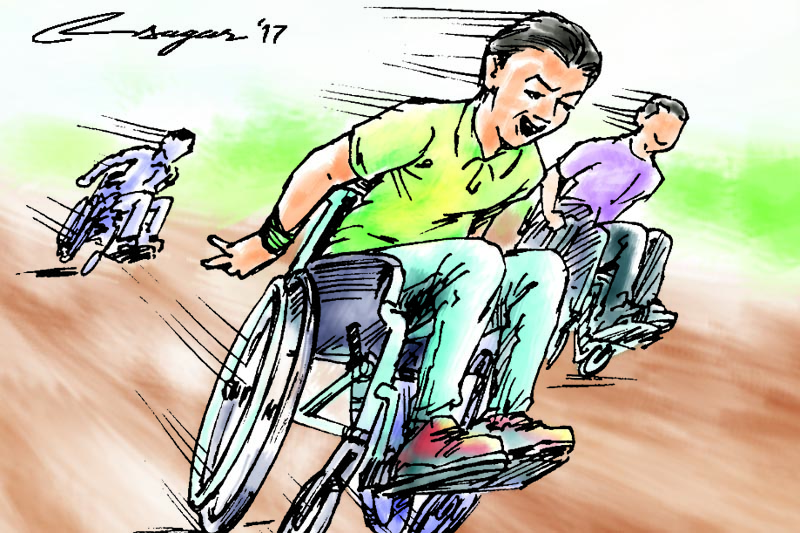Importance of sport: Unifying people
If you browse the web, you will be totally amazed by the number of organisations using sports for social purposes with many of them active in the most hostile and difficult places as they found in sport an effective way to share messages
The 6th of April is celebrated globally as International Day of Sport for Development and Peace, IDSP, a special day to highlight the importance of sport in reducing poverty, directly contributing to the creation of more fair and peaceful societies across the globe.
Today athletes, organizations and members from the civil society from all over the world are joining hands with special initiatives for this year edition of the day whose central message well converges with the new UN Secretary-General’s call to turn 2017 into a year for peace.
António Guterres, on his first day of service at the helm of the United Nations, made an appeal to join him, asking citizens for a “commitment to peace, today and every day”, making 2017 a year for peace, as “Peace must be our goal and our guide”.
Though symbolic the appeal is a powerful reminder of the mounting challenges faced by humanity: inequities feeding into poverty, creating a pervert cycle of vulnerability that brings about more injustices.
With an increase in the level of climate change shaking local ecosystems and with an unfair form of globalization dictating the ways social economic opportunities are shaped, still far too many millions of people are lagging behind, surviving at the bottom of their own societies, unable to strive and harness their capabilities.
Sport playing is not a magic bullet that can easily solve rooted and structured problems in the developing world as well as in the more prosperous societies.
Yet there is hardly any better tool at unifying people than sport, a real platform to create a level playing field, offering opportunities for youths and most importantly, an incredible “incubator” of something we are running short these days: hope.
If you play any kind of sport or if you are a keen fan of a team, you know that sports offer a much welcome respite from the everyday problems, a way to channel your frustrations but also a great way to nourish a personal passion that brings you closer to others.
Yet while there is no doubt that life would be totally different without sports, we are still far from tapping into its potential, leveraging not only its appeal but also its effectiveness to transform people and individuals, turning them into better persons.
That’s why it is important to celebrate the International Day of Sport for Development and Peace today because we need to fully acknowledge not only the recreational or leisure aspect of sport but also its contributions for development and prosperity and peace.
If you browse the web, you will be totally amazed by the number of organizations using sports for social purposes with many of them active in the most hostile and difficult places as they found in sport an effective way to share messages, be they about nutrition, sanitation, HIV/AIDS or reconciliation across different communities.
This is not happening just because sport playing is common everywhere but also because, relatively to many other approaches, it is much more cost effective and potentially impactful.
It comes as cost effective because you can quite easily organize a game by mobilizing local volunteers even though you need to put a great effort in their selection, training and retention.
Surely you should not be mistaken: if you think that sport for development is a shortcut for achieving social goals, you are in the wrong track as it a great deal of energies and thinking about how best harnessing its potential but its impact can be really huge.
As community aggregator, sport playing can facilitate a dialogue among communities or groups who are at the loggerheads where violence might erupt, furthering pushing the groups aside, creating more recriminations and suspicions among them.
As an leadership enhancer, sport playing can bring the best out of a youth, highlighting key values that are intrinsic to it: respect, team playing, sacrifice, grit, positive attitudes, and personal accountability.
Coach John Wooden, the most successful college basketball coach in the USA, was a great master in embedding its players with such life values, and its books are held as leadership essential readings.
There are challenges of course as few people still understand how sport playing can be used in the development sector.
Too few development agencies in Nepal are harnessing its potential and scale it at a level that could bring transformational changes at society level and this despite the fact that as a small country, Nepal has been having its successes on sport for development if you think how blind cricket or wheelchair basketball are emerging and getting stronger also from the aspect of the quality of the game.
With global efforts taking place in the direction of proving and measuring the impact of sport playing, hopefully more development institutions will take notice and invest in it.
Positively, more and more civil society organizations are now using sports in areas prone to conflicts like in the Tarai. It is welcome that the Ministry of Youth and Sport has been active these days to promote it among local youths in the plains of Nepal. Surely much more can be achieved if, collectively, we decide to invest in sports.
Galimberti is the Co-Founder of ENGAGE, a local not-for-profit promoting sports and personal development for youths with disabilities






